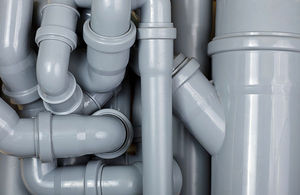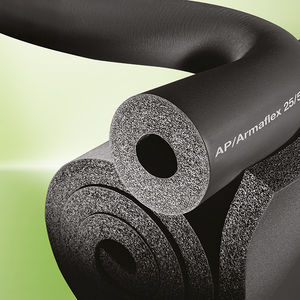April 2, 2024 By Kartik Patel - Armacell Technical Manager-Insulation
Insulating plastic pipes are just as important as insulating metal pipes.
 Plastic piping, whether it be PE, HDPE, CPVC, PVC, ABS or PEX, is used frequently in all types of buildings and its market share continues to grow as plastic pipes are reliable, safe, cost-effective, and energy conscious building materials. Plastic is used for pipes in systems such as domestic hot and cold water, wastewater, condensate, natural gas, and chilled-water. In most of these applications, just like metal piping, plastic pipe should be thermally insulated to reduce energy consumption and prevent condensation.
Plastic piping, whether it be PE, HDPE, CPVC, PVC, ABS or PEX, is used frequently in all types of buildings and its market share continues to grow as plastic pipes are reliable, safe, cost-effective, and energy conscious building materials. Plastic is used for pipes in systems such as domestic hot and cold water, wastewater, condensate, natural gas, and chilled-water. In most of these applications, just like metal piping, plastic pipe should be thermally insulated to reduce energy consumption and prevent condensation.
The importance of insulating plastic pipes
Saving energy saves money and reduces a building’s carbon footprint, and insulation is the most effective method to save energy for all piping systems including plastic. Plastics have a lower thermal conductivity than metals and, given that, it is often assumed that they don’t need insulation; however, insulation applied on plastic pipes can reduce heat loss or gain by up to 75% when compared to uninsulated plastic pipes. In cold applications, insulating also protects against condensation and freezing which protects the building from damage and is required by some building codes.
Elastomeric foam is ideal for insulating

What is suitable and compatible insulation for plastic piping? Closed cell elastomeric foam insulation, like AP Armaflex, can safely be used on most types of plastic piping. If using contact adhesive, like Armaflex 520, to install the insulation, it is recommended not to use the adhesive to glue the insulation directly to the pipe, but small amounts that get through the seams will not damage the pipe. AP Armaflex Black or White Lap seal are also perfect products for plastic pipes as the contact adhesive is then only required on the end joints. And remember…always protect the insulation with an outdoor rated covering or WB Finish when it is installed outdoors. *AP ArmaFlex can be used on ABS pipes operating below 86 °F (30 °C) and for pipes operating above 86 °F (30 °C) the recommended product is ArmaFlex UT.
